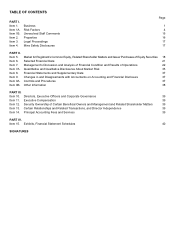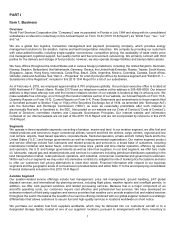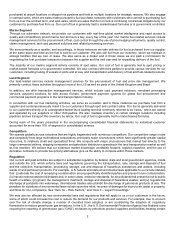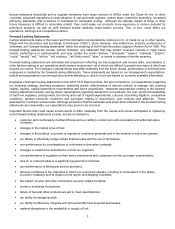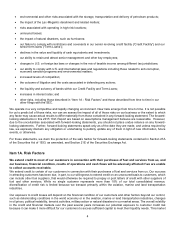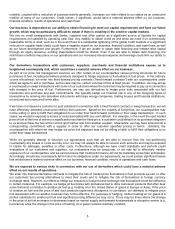World Fuel Services 2015 Annual Report Download - page 15
Download and view the complete annual report
Please find page 15 of the 2015 World Fuel Services annual report below. You can navigate through the pages in the report by either clicking on the pages listed below, or by using the keyword search tool below to find specific information within the annual report.10
•
the operation of fuel storage and distribution facilities;
•
workplace safety;
•
fuel spillage or seepage;
•
environmental protection;
•
consumer and data protection;
•
payment card industry data security standards;
•
government contracting and procurement;
•
anti-trust and other applicable competition laws;
•
anti-money laundering and statutes and regulations governing the transmission of funds;
•
regulatory reporting and licensing requirements; and
•
hazardous waste disposal.
Due to the complex and technical nature of these laws and regulations, inadvertent violations may occur. If we fail to comply
with these laws or regulations for any reason, we would be required to correct or implement measures to prevent a
recurrence of any violations, which could increase our operating costs. If more serious violations were to occur, we could
be subject to substantial fines or penalties or to civil or criminal liability. In addition, compliance with existing and future laws
regulating the delivery of fuel by barge, truck or railcar, fuel storage terminals and underground storage tanks that we own
or operate may require significant capital expenditures and increased operating and maintenance costs. For example, rail
incidents in the last several years have led and are likely to continue to lead to additional governmental regulation of rail
shipments of crude oil and other fuel products in Canada and the United States and to increased safety standards for the
railcars that transport these products, including specifications mandating modified railcar designs, configurations, materials,
and equipment. These regulations could result in higher operating costs for us, such as if we are required to pay for the
modifications to railcars we lease or such railcars become obsolete, which could adversely affect our operating results.
To the extent that we use third parties in our operations, we are also subject to the risk that we would be held accountable
for the failure of these third parties to comply with the laws and regulations of the U.S. and various international jurisdictions.
Any significant fines and costs incurred as a result of such regulations could have a material adverse effect on our business
and results of operations.
We are subject to unique business risks as a result of selling to government customers and reduced sales to our
government customers could adversely affect our profitability.
U.S. and foreign government budget constraints and the withdrawal of armed forces from Afghanistan are expected to
continue resulting in a decrease in defense spending, which in turn can cause a significant reduction in sales and related
profit in our government services business. Furthermore, due to the nature of these types of conflicts, withdrawals from
certain areas may be sudden, subjecting us to losses or higher expenses associated with disposing of unused inventory,
removal or abandonment of equipment and relocation of employees. Furthermore, as government contracts are
requirements based, profitability associated with our government services business may fluctuate significantly from time to
time as a result of the commencement, extension or completion of existing and new government contracts. As a result of
complex logistics and extended payment terms for our government customers, sales of products and services to such
customers generally carry higher margins than sales to other customers. Accordingly, a decrease in government sales could
contribute disproportionately to a reduction in our gross margin and profitability and such decrease could be sudden. The
loss of a significant government customer or a material reduction in sales to government customers could adversely affect
our business, financial condition, results of operations and cash flows.
In addition, contracting with government agencies is inherently complex. Government contracts are subject to specific
procurement regulations and a variety of other requirements, which affects how we transact business with our customers
and can impose additional costs on our business operations. Government contracts are also generally subject to oversight,
including audits and investigations which could identify violations of these agreements or applicable procurement
regulations, such as the Federal Acquisition Regulation for contracts with the U.S. federal government. Such violations
could result in a range of consequences including, but not limited to, contract price adjustments, civil and criminal penalties,
contract termination, forfeiture of profit and/or suspension of payment, and suspension or debarment from future government
contracts. The occurrence of any of these actions could harm our reputation and could have a material adverse impact on
our business, financial condition, and results of operations.
Changes in the market price of fuel may have a material adverse effect on our business.
Historically, fuel prices have been extremely volatile and will likely continue to be volatile in the future. Fuel prices are
impacted by many factors beyond our control, including:


